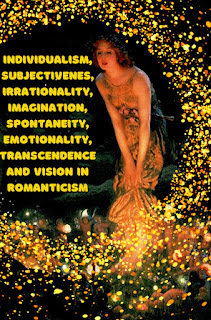Skip to main content
Individualism, subjectiveness, irrationality, imagination, spontaneity, emotionality, transcendence, and vision in Romanticsim
.jpg)
Romanticism resisted the
aristocratic norms of the Age of Enlightenment. By granting individual
imaginations approval as critical authorities, the Romantic movement allowed
art to be liberated from classical notions of form. As libertarians, they
opposed the exploitation of the poor and advocated for liberty. In this era,
individuals were viewed as important; those with ideals were served over those
with rules and conventions. The Romantic period, in addition to its emphasis on
emotion and individualism, glorified the past and nature, giving preference to
the medieval rather than the classical era. The artists emphasized the
importance of sensitivity, emotion, and not just rationality and order as means
of understanding the world and experiencing it. In the enduring quest for
individual rights and liberty, Romanticism honored the imagination and
intuition of the individual. There are a number of characteristics of romantic
literature, including subjectivity, individualism, spontaneity, freedom from
rules, solitary living instead of living in society, the belief that
imagination is superior to reason, love of beauty, and a devotion to nature. Nature
inspires almost a religious response in us. It was important to them not just
to treat Nature scientifically, but also to regard it as a living force, an
agent of creativity, a divine being with a vital role to play in human affairs,
something not to be ignored. Individualism, reverence for the natural world,
idealism, physical and emotional passion, and interest in the mystic and supernatural
were traits of Romantic poets. In romantic art, emotions, feelings, and moods
of all kinds are represented, including spirituality, imagination, mystery,
fervor, etc. In addition to landscapes, religion, revolution, and peaceful
beauty, the subject matter ranged widely. The Romantics believed that humans
are good by nature, but civilization inhibits that quality. It was believed
that the savage is noble, childhood is good, and human emotions soar
because of both beliefs. During the Romantic period, intuition was thought to
be superior to deduction in gaining knowledge. Nature, human feelings,
compassion for mankind, the freedom of individuals, Romantic heroes, and the
rejection of society are common themes among Romantic writers. Also, writers
express their discontent with all that seems standardized, inhuman, and
commercial. Rebellions are driven by passion, not reason, romantic rebellions are
romantic. A rebel must denigrate the possibility that things might actually be changed
for the better when he recognizes this impracticality. At the end of the
Romantic era, dissatisfied intellectuals and artists challenged the
Establishment, bringing about a significant change in society. A core component
of this movement in England was the Romantic poets. As libertarians, they
opposed the exploitation of the poor and advocated for liberty. Bourgeois society
imposed cold abstract rules and rituals on men and women that Romantics were
against. A certain set of social customs was introduced when the bourgeois rose
to power, promoting, defending, and openly profiting from the Revolution of
1830. As part of the Romantic movement, the following were characteristics: a
deeper appreciation of nature; an exaltation of emotions over reason, and the
senses over reason; an examination of the self, and the changes in mood and
mental capacities that we experience as individuals through heightened
awareness. In Romanticism, the emphasis is on the individual and on
self-expression, which is not easily defined. Bourgeois society imposed cold
abstract rules and rituals on men and women that Romantics were against. Late
18th- and 19th-Century reaction against the neo-classical reason: an attempt to
liberate individual imagination and embrace our arson which sought to liberate
the individual human imagination and embrace its passions, dreams, and
irrational visions as sources of wisdom. Also, it was a reaction against the
Enlightenment and the rationalism and physical materialism of the 18th century
as a whole. Individualism, subjectiveness, irrationality, imagination,
spontaneity, emotionality, transcendence, and vision were all important to
Romanticism.
Comments
Post a Comment